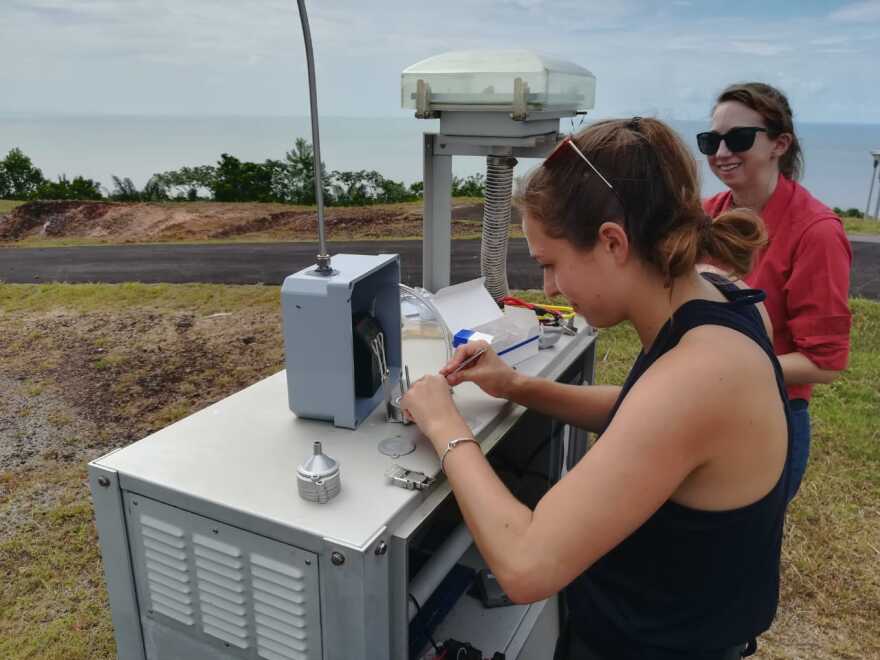Thanks to research done at the University of Miami, we know the epic dust clouds that drift out of North Africa may sometimes prevent hurricanes. (They block the solar energy those cyclones need to form out in the Atlantic.) Now UM scientists have made another discovery linking Africa and the Americas – and this time it’s about smoke. They’ve found that fire smoke from southern Africa also floats our way and has a big, often beneficial impact on the Amazon rainforest and our oceans.
Cassandra Gaston, a professor at UM’s Rosenstiel School of Marine and Atmospheric Science, is the study’s senior author. She spoke with WLRN’s Tim Padgett about what this smoky science means for our hemisphere – including all that Sargassum seaweed on South Florida's beaches this summer.
Excerpts from their conversation:
READ MORE: How We Left Hurricanes in Our Dust This Year - Literally.
WLRN: What originally brought this African smoke phenomenon to the attention of you and your UM team?
GASTON: There's been a long held hypothesis that African dust can fertilize the Amazon rainforest.
The same dust the scientists believe may also prevent hurricane formation out in the Atlantic?
That's right. So African dust gets transported here during two different seasons. We're more familiar with the summertime dust because it impacts us here in South Florida. But what we're looking at is wintertime dust that gets transported to South America, which hasn't been talked about as much.
So Joe Prospero, an emeritus professor at the Rosenstiel School, started a measurement site in French Guiana, which is on the [northeast] coast of South America. And my students started analyzing the data set – and we were shocked at how much phosphorus we found in our samples.
The atmosphere has no walls. One person's air pollution problem in one part of the world can have a beneficial impact in another part of the world. –Cassandra Gaston
So that suggested this may be something more than just dust?
Right. It was a completely different source that we weren't thinking about before. So we used remote sensing products like satellite to track smoke plumes that were being transported all the way from southern Africa to our site and having an impact.
What did you find in the smoke itself – and why is it so good for the Amazon rainforest?
There were a lot of nutrients in that smoke. A lot of these tropical ecosystems are phosphorus-depleted, which means that if you want to promote their growth you need to add phosphorus to the soil or to the nearby ocean in order to stimulate that growth. The smoke is acting as an additional fertilizer for the Amazon rainforest and having a beneficial impact.
Can we assume most of the smoke coming from southern Africa is from fires that are clearing land and trees?
That's certainly part of it. There's also industrial emissions as well.
ENVIRONMENTAL SINS
But if that smoke really does aid the Amazon – which itself is under constant threat of slash-and-burn deforestation – is this the case of one continent's environmental sins helping to heal those of another?
I guess that's one way you could think about it. I don't know how much [the African smoke] would help recover [depleted] forest. But you bring up a good point, though, which is that the atmosphere has no walls. One person's air pollution problem in one part of the world isn't just limited to that part of the world.

So to what extent should we be worried about that air pollution issue here in South Florida right now?
Well, with the southern African smoke, we don't see evidence that it would make it as far north as Miami. But it's certainly of concern to parts of South America.
How then can the smoke be beneficial to our oceans here in this hemisphere when it gets here?
There are regions of the Atlantic Ocean that are also phosphorus-limited. Once the smoke hits the ocean it is going to release a lot more of its phosphorus into the water. And the reason why we care about that is because if you stimulate plant growth in the ocean, as in the Amazon rainforest, then that would have a positive impact on taking things like carbon dioxide out of the atmosphere.
Right – but you’ve also mentioned the potential for the smoke helping create Sargassum seaweed that's plaguing our beaches here in South Florida right now.
Yes. The nutrients are so biologically accessible to things like seaweed or plankton in the ocean that it could certainly be playing a role. There's just a lot more research that needs to be done to look at what all the nutrient sources are that are going to the Caribbean and to parts of South Florida, and what sort of impact they're having.
You just have to remember that some things are going to have a net positive impact; some things will have a net negative impact. And understanding the balance is what we do as scientists.



